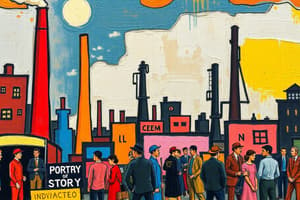Podcast
Questions and Answers
Which of the following was a result of the boom in agriculture production of the eighteenth century?
Which of the following was a result of the boom in agriculture production of the eighteenth century?
- People had more money to spend on manufactured goods (correct)
- Manufactured goods became less affordable
- People had less money to spend on manufactured goods
- Agricultural production decreased
Until the eighteenth century, most energy in Europe came from?
Until the eighteenth century, most energy in Europe came from?
wood
What did the British economist Thomas Malthus argue?
What did the British economist Thomas Malthus argue?
population always grew faster than the food supply
Outside of Europe, what country industrialized the earliest?
Outside of Europe, what country industrialized the earliest?
What were handicraft workers who smashed new machines they believed were putting them out of work known as?
What were handicraft workers who smashed new machines they believed were putting them out of work known as?
Who wrote The Condition of the Working Class in England?
Who wrote The Condition of the Working Class in England?
What did The Condition of the Working Class in England propose?
What did The Condition of the Working Class in England propose?
What did Robert Owens argue in 1816?
What did Robert Owens argue in 1816?
What did the Factory Act of 1833 limit a single factory workday for children up to the age of 13 to?
What did the Factory Act of 1833 limit a single factory workday for children up to the age of 13 to?
Flashcards are hidden until you start studying
Study Notes
Agriculture and Economy
- Eighteenth-century agricultural boom resulted in increased disposable income for people, enhancing demand for manufactured goods.
Energy Sources
- Prior to the eighteenth century, Europe primarily relied on wood as its main energy source.
Population and Resources
- Economist Thomas Malthus highlighted the disparity between population growth and food supply, asserting that population consistently outpaced available resources.
Industrialization
- Japan is recognized as the first non-European country to industrialize, setting a precedent for modernization outside of Europe.
Labor Movements
- Handicraft workers, known as Luddites, protested against industrial machines fearing job losses by destroying the machines.
Key Literature
- Friedrich Engels authored "The Condition of the Working Class in England," critiquing the treatment of workers during the Industrial Revolution.
Social Critique
- Engels' work accused British middle classes of committing "mass murder" and "wholesale robbery" through exploitation of working-class citizens.
Child Labor
- Robert Owen, in 1816, advocated against child labor in factories, emphasizing potential dangers to children's health and well-being.
Factory Regulations
- The Factory Act of 1833 established a legal limit for the workday of children aged 13 and under to eight hours, aiming to improve working conditions.
Studying That Suits You
Use AI to generate personalized quizzes and flashcards to suit your learning preferences.




